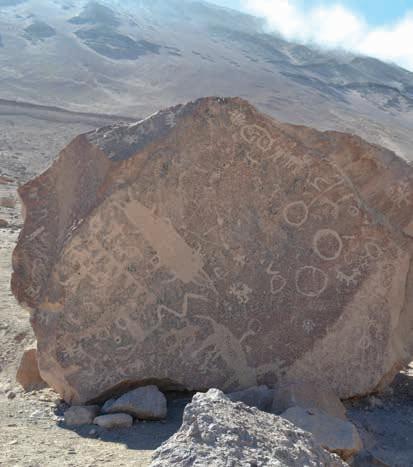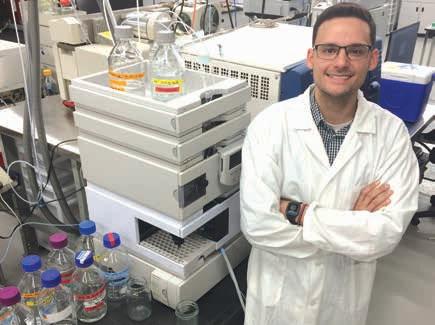
4 minute read
Spotlight on Research
As home to many leading researchers, Trent University has countless stories to tell when it comes to research success. Through our outstanding researchers, exceptional facilities, and prestigious schools of study, Trent is a place where ideas and creativity connect and intersect with industry, non-profits, communities and real-world solutions. Read more about some of the top faculty, student, and alumni researchers who are making an impact.
FACULTY RESEARCH SPOTLIGHT When & Where Did Humanity First Impact the Environment? Trent Researcher has the Answer
FACULTY
Exploring societies that existed centuries before our own inspires us to think about restoration, conservation and our relationship with the environment today. That’s research that inspires. A team of international researchers including Trent’s own Dr. Paul Szpak has found that agricultural activity more than 2,000 years ago in the Bronze Age in Ireland is the tipping point for when humanity first began to cause environmental change. “People are increasingly aware of the fact that humans are having a profound impact on the planet, but when people think about these impacts, they are usually thinking about global climate change, large-scale species extinctions, and widespread contamination of various ecosystems with pollutants,” explains Professor Szpak, Anthropology professor and Canada research chair in Environmental Archaeology. “What we are seeing more and more is that the environments that we assumed were ‘pristine’ when the Industrial Revolution kicked off had already been impacted by humans in major ways. One of the most important reasons for this is the tendency of Western societies like ours to view culture (and humans) as separate from nature, rather than a part of it.”

Photo courtesy of Dr. Paul Szpak, Anthropology professor & Canada research chair in Environmental Archaeology
STUDENT
STUDENT RESEARCH SPOTLIGHT Inspiring the Next Crop of Farmers

Willow Denis is committed to helping new farmers thrive. Currently in her first year of the master’s program in Sustainability Studies at Trent, Ms. Denis is proposing a unique start-up business for the Peterborough area—a farm incubator. The proposed incubator involves a piece of farmable land subdivided into small spaces leased to new farmers at below market prices to provide space to enact their business plan with reduced risk, while also providing equipment sharing and mentorship in collaboration with existing farmers. All this is focused on the creation of opportunities to help aspiring farmers acquire the place-based knowledge they need to get into and succeed in local agriculture.
“Formal education in sustainable agriculture and food systems provides the theoretical knowledge base, but cannot fully expose students to the complex ecological, social and economic aspects of life on a farm,” she says. “A farm incubator in Peterborough, as a collaborative project between Trent and the agricultural community, will act as a means of creating space for new farmers.”

ALUMNI
ALUMNI RESEARCH SPOTLIGHT Plant Hormones in Mammals: A Trent Discovery

What makes plants branch, flower, and grow seeds? Plant hormones. And the impact of these hormones extends far beyond the realm of botany. From within a lab at Trent, studies of plant hormones and chemistry have unearthed a new discovery that could play a key role in fighting cancer. Under the supervision of Trent’s Dr. Neil Emery and Dr. Craig Brunetti, and with the help of Adam Noble, CEO and founder of Noblegen, Mark Seegobin ’10, a Trent alumnus and a current Ph.D. student in the Environmental and Life Sciences program, found that a full plant hormone pathway, also known as cytokinins (CKs), exists in dogs. Although these CKs are hormones commonly studied in plants and play a significant role in all stages of growth, in mammals only a single CK had previously been found—until this new research discovered six more. “Understanding the hormones’ role in mammals might unlock their potential as therapeutic agents and lead to new discoveries in mammalian biology,” Mr. Seegobin says. He plans to work with the team to study whether CKs could act as potential treatments for viral infections, neurodegenerative diseases and cancer. Bold research making a difference in the world. That’s the Trent University way. Read on for just a few recent highlights that showcase the ways in which Trent continues to challenge the way we think.
RESEARCH EXCELLENCE THRIVING AT TRENT

Meet Trent’s Newest Research Chair “Canadian to Watch” Dr. Whitney Lackenbauer has joined Trent’s distinguished School for the Study of Canada after receiving $1.4 million in federal funding as a new Tier I Canada research chair. His research mission? As one of Canada’s foremost experts on Arctic history and contemporary Northern policy, Professor Lackenbauer will strive to improve academic, policy and public dialogue related to Canada’s North, involving students along the way.
$250,000 in SSHRC Funding Supports Trent Researchers The innovative research of three Trent University researchers in the Departments of Anthropology and History received a significant boost recently thanks to $250,000 in new funding from the Social Sciences and Humanities Research Council (SSHRC).
Dr. Gyles Iannone and Dr. Anne Meneley of Trent’s Anthropology Department will use the funding to advance their research projects examining the socio-ecological history of Bagan, Myanmar, and societal impacts created by walking with digital self-tracking devices. In the History Department, the national funding will assist Dr. Katrina Keefer in developing a searchable database to assist with the identification of African pre-slavery individuals, societies and families.
Follow @TrentUniversity #TrentUResearch on Twitter to read more research highlights and stories, and share your own #TrentU research stories.










